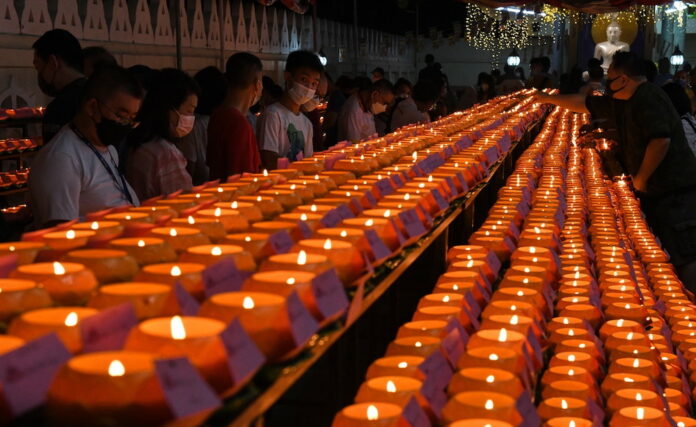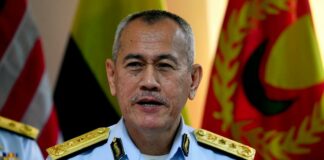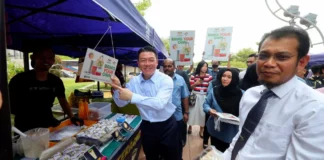KUALA LUMPUR, May 15 – Wesak Day is usually celebrated in a big way among Buddhists in the country but street processions with a sea of orange robes will not be seen this year to avoid massive crowds as devotees emerge from a two-year abstinence of avid festivity due to the COVID-19 pandemic.
A Bernama survey in several states saw Buddhists families fervently visiting temples in the early hours of the morning to hold religious ceremonies and pay homage to Siddharta Gautama, the religion’s founder.
They performed religious rituals by lighting candles and offering flowers to commemorate the birth, enlightenment and death of Gautama Buddha.
The grounds of the Maha Vihara Buddhist Temple in Brickfields here was filled with devotees as early as 8 am and moderate crowds began queuing in the grounds of the synagogue to carry out religious activities such as rice and flower offerings and lighting of candles as well as making donations to the temple.
Sirisena Perera, president of the Sasana Abhiwurdhi Wardana Society, said the Buddhist Maha Vihara Temple in Brickfields will not stage three major events on this year’s Wesak Day to control the size of crowds.
“One of the key activities on Wesak Day is a blood donation campaign, the second is we will not be distributing free food and drinks while the last refrain is that we will not hold a procession. Normally on Wesak Day, in the evening, there will be a chariot procession which can easily draw a 100,000-strong crowd accompanying it on foot,” said Sirisena at the temple today.
The venerable elder said the temple is expected to receive only 50 per cent of the usual congregation for Wesak Day before the pandemic struck where the normal crowd would be from 30,000 to 40,000.
In SELANGOR, the venerable ‘Bhikkhuni’ named Man Hui, 60, of the Fo Guang Shan Dong Zen Temple in Jenjarom, said Buddhists began filling the grounds as early as 8am today for prayers.
“We expect more than 5,000 visitors to attend prayers here because the Wesak Day celebration at this temple is held over two days from yesterday. Before COVID-19, about 10,000 devotees from inside and outside Selangor will turn up,” said the Buddhist nun.
“Today there is a prayer, sermon and chanting from 10 am to 6 pm, a physical Buddhist bathing ritual for the baby Buddha,” said the fully ordained monastic deputy chief at the temple in Kuala Langat today.
In MELAKA, Buddhists started celebrating Wesak Day since yesterday with a temple countdown to midnight and this morning, the Cheng Hoon Teng Temple in Jalan Tokong held a donation drive for the needy.
Cheng Hoon Teng Temple is one of the oldest temples in Malaysia, built in 1673 by Captain Lee Wei King with the stature of being awarded Outstanding Architectural Restoration by the United Nations Cultural and Scientific Educational Organization (UNESCO) in 2003.
In KEDAH, the Siamese community was huddled for religious ceremonies at Wat Siam Teluk Wanjah in Alor Setar after almost a two-year absence due to the COVID-19 pandemic.
In PERAK, Wat Siribunyamagaram Temple in Jalan Tambun was among the temples around Ipoh steeped into religious ceremonies to celebrate the birth-death cycle of Buddha.
In KELANTAN, despite the absence of a large-scale Wesak Day celebration, several Siamese temples around Tumpat continued to be thronged by devout visitors.
A Bernama survey at Wat Photivihan in Kampung Jambu, famous for its 40.9 metre-long ‘Sleeping Buddha’, with a height of 10.9m, received devotees from 8.30am.
Chow Fook Weng, 40, from Gelugor in Penang said he and five work colleagues at a construction site in Kota Bharu took advantage of the public holiday today to visit the abode of worship.
“The celebration here is not as lively as in Penang, but it’s okay … my friends and I came to pay homage and also to marvel at the architecture of the Siamese community in this wat,” he said.
Apart from that, another temple in Tumpat, Wat Machimmaram in Kampung Jubakar which houses a sitting Buddha statue also received visits from the public.
In PENANG, Chief Minister Chow Kon Yeow hoped that this year’s Wesak theme of ‘Promoting harmony through mutual respect and help’ would inspire Buddhists and non-Buddhists alike to live in peaceful unity.
“As we deal with the COVID-19 pandemic, it is very clear that empathy, humility and unity are essential to the well-being of the people. I hope that with continuous efforts, we will triumph in overcoming the virus and its devastating consequences,” he said in a Wesak Day message which reflects the spirit of Malaysian Buddhists.
















